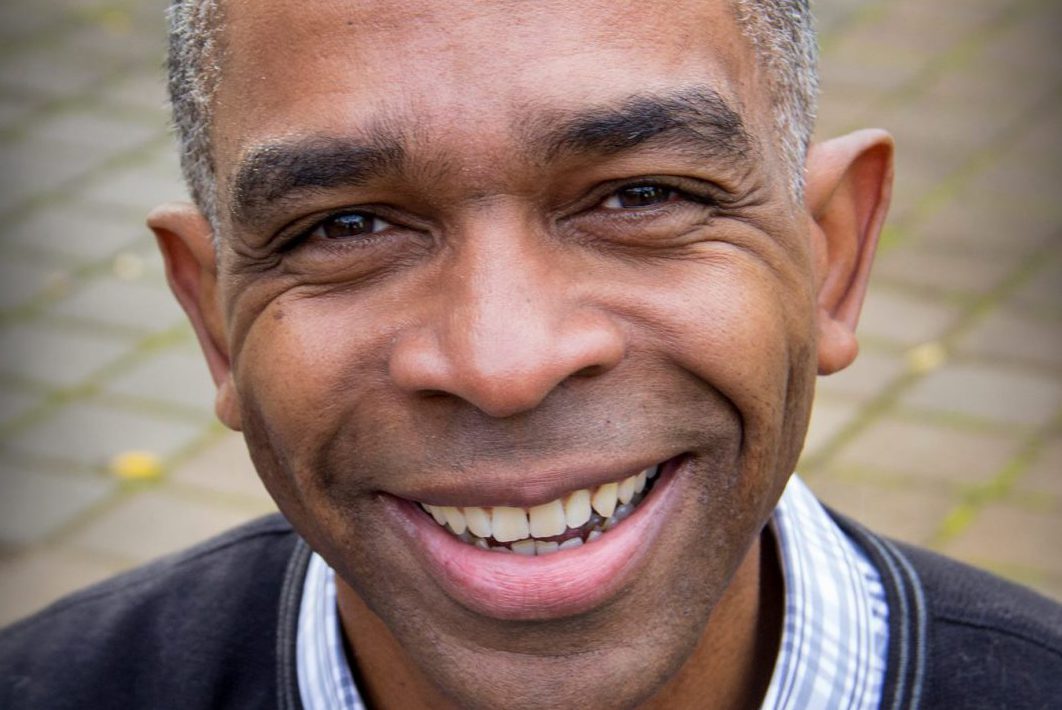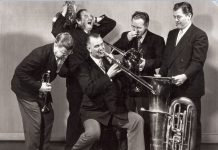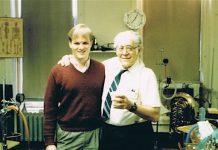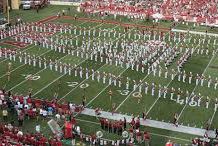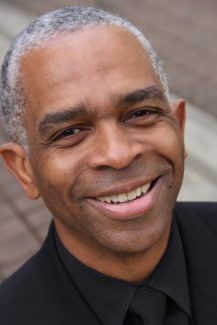
Dr. Dorsey is currently Professor of Bands at Indiana University’s prestigious Jacobs School of Music. Prior to that, Dorsey was the director of bands and conductor of the Wind Ensemble at the University of Oregon, and was the associate director of bands at the University of Michigan, where he conducted the Concert Band, the Michigan Youth Band and taught undergraduate conducting.
Dorsey studied conducting with James Croft, John P. Paynter and Mallory Thompson. He was a clarinet student of Fred Ormand and Frank Kowalsky. He gained extensive experience teaching in the public schools of Florida and Georgia.
Ensembles under Dorsey’s direction have performed at several state and national events, including the College Band Directors National Association Regional Conference and the Bands of America National Concert Band Festival. He is active as a guest conductor, clinician and adjudicator in the United States and has welcomed engagements in Bulgaria, Hungary and Canada.
Dr. Rodney Dorsey Interview – Fall, 2018
1. Growing up in Florida, what was your educational experience like?
I grew up in Gainesville, FL and I went to the University of Florida’s lab school, P.K. Yonge. I attended that school from Kindergarten through 12th grade. The experiences I had there, in band, were unique because I realized that our band director’s job wasn’t full time. We rehearsed everything before school started. Nothing was co-curricular. Marching band was from 7:30 to 8:15 in the morning. I started playing the clarinet in band in the middle of fourth grade. I did that because many of my friends were getting out of class to do this “band thing.” I wanted to play an instrument, but the timing to join was precipitated by my friends. We were fortunate too, because every band director we had made the group better. My first band director was David Miller. After him was Robbie Roadman, who was there for about a year. Then there was Everett McConn, who stayed for a handful of years. And my last three years of high school, I had Robert Sheldon, the composer. I never felt like the band declined in quality with the band director changes when it potentially could have. Each director took us a little bit further and made us better.
I started clarinet lessons with my mother’s friend, Jerry Miller, who taught with her at Lincoln High School when the schools were segregated. I would walk to his house and have my clarinet lessons in his garage. After studying with him for a while, he told my mom that he had taken me as far as he could take me, “He needs somebody at the University of Florida.” Then I took lessons from two UF students before studying with the teacher at the University. My middle and high school education was great. The UF connection allowed me to play in the college band and orchestra while I was in high school. I went to summer camp at FSU and that’s when I realized that the music program at FSU was really good. I was offered a scholarship and that’s how I got to FSU.
My parents’ occupations were your stereotypical occupations for African-Americans during that time. My mom taught Home Economics for 25 years and my dad owned a funeral home. But you know what? I attended all those class reunions, with my mom, and heard grown men and women talk about how important her classes were to them. That sent a strong message to me that teaching is important, it’s something that should be valued and it was something that I wanted to do. I realized early on that the funeral business was not for me. I specifically remember the day I told my dad that I wanted to major in music. I was at the funeral home, sitting in his office. I told him and in his own quiet way he said, “Well, if that’s what you want to do, that’s fine.”
2. How did the clarinet become your instrument?
I remember telling my mom somewhere along the way that I wanted to take organ lessons. Being a teacher, she waited to see if I was serious. After a while, I stopped asking about it. Then, I said that I wanted to take guitar lessons. She waited on that too. I think in her own way, that was to see if I was really serious about these lessons. I had a coloring book with instruments in it. And by literally looking at the pictures, I narrowed it down to trumpet, clarinet and saxophone. I remember looking at the trumpet and thinking, “It’s only got three buttons. It can’t be that easy.” I don’t remember going through the whole middle school process where the director matches you up with an instrument. I didn’t understand it at the time – that all the keys on the saxophone and clarinet work together to form notes. I just thought that every key did something different. I started band about halfway through the year, but somehow, the director let me join band.
3. Who were your biggest influences – musical or otherwise?
One of the biggest influences was definitely my mom, just in terms of commitment to service. After she retired from teaching, she got a job with the Alachua County extension office in town. It was a county office with a program that made sure people in the community were eating well. She was very active in her church. She was also active on the business side of things with the funeral home. Jerry Miller, a teacher I mentioned earlier, was a big influence on me. He was the first person who taught me how to count. He sat down with me and a Klose book and said, “This is a time signature. The top number tells you how many beats are in a measure and the bottom number tells you what note value gets one beat.” My high school band directors were great influences because they pointed me in directions of opportunity.
Frank Kowalsky, my second clarinet teacher at Florida State, was a huge influence on me. He is responsible for teaching me to be a musician, not just a band or clarinet jock. I had the Tokyo recordings, band CDs and CDs of clarinet players – I knew all of this stuff. During a lesson with him, he said, “Do you know Strauss’ Four Last Songs?” I said, “No.” He said, “You need to get a recording of Strauss’ Four Last Songs with soprano, Elisabeth Schwarzkopf.” I went to the store, bought it, started listening to it and it changed my life. That’s when I got hungry for recordings of other musicians, who were great singers, who were great cellists, violinists, piano players, etc. Jim Croft was another huge influence. He was a unique individual because once you met him, it felt like you’d known him forever. Very personable. I didn’t realize he had an entire career as a high school director before he came to FSU. I still wonder how he was able to get that big symphonic band to play with such lightness and buoyancy. He never over-conducted the ensemble. He sang a lot during rehearsals. Living vicariously through other students who studied with him, I learned how to be a good colleague. You can’t be isolated in your own little world and not invite faculty to solo with your group. You have to be interested in what they’re doing too. Dr. Croft would often work late. One night, I passed by his office and I saw a light. I knocked on the door, and he answered. I said, “Dr. Croft, what are you still doing here?” He said, “I’m working late.” So, since I was there, I asked him about his high school teaching career. He spent about 45 minutes talking to me. I still have two of the programs from his Oshkosh High School Band concerts that he gave me. I remember leaving his office thinking, “Man, I should’ve done this a long time ago.” I tell my current students to ask their professors about their careers. If you find a professor who’s doing what you would like to do, ask them how they got there. Somebody complimented me once when Dr. Croft was around. Dr. Croft said, “Rod is a product of some very good models.” And he was right. I just happened to have good clarinet teachers, band directors in high school and parents who supported that.
4. Did you do any middle school or high school teaching before you went to University of Michigan?
Yes. After I graduated from FSU, I taught for three years at Rickards High School in Tallahassee, FL. After that, I went to Northwestern University for my Master’s degree in 1991-92. At that time, the Master’s degree was a one-year program. After graduation, I taught for a year at Forest Park High School in Forest Park, GA. A new high school opened in Lakeland, FL – George Jenkins High School and I taught there for four years. This was where I finally got to see a freshman class graduate. Then, I went back to Northwestern and directed the athletic bands for three years. I also started my Doctorate while I was at Northwestern. After I finished my Doctorate, an opportunity opened at DePaul University in Chicago. I was there for five years. I then went to the University of Michigan as the Associate Director of Bands for seven years, to the University of Oregon for five years, then Indiana University. Whenever I lay that out, it almost sounds like I can’t hold a job, but each one was a better opportunity for me.
5. What was it like going from Michigan to Oregon?
I really enjoyed my time in Oregon. I had never been to Oregon, in fact, my first time there was for the job interview. The applied faculty were very welcoming. The University of Oregon is a school where people don’t get hung up on tradition. People were always open to trying new things and that was very helpful to me as the Director of Bands. The students were the same way. The University of Oregon gave me an opportunity to try new things, and if they didn’t work out, revise it or modify it in a way that would make it better. I enjoyed my time there.
6. You’re now Professor of Bands at Indiana University. How would you like to put your stamp on the storied band program there?
If you think about it, very few departments, in a School of Music, operate like a band department with a “supreme leader.” Other departments have a chair and that chair position rotates among the faculty in that department. It is like a shared governance model. So, the band area faculty and dean thought, “we have a chance, here, to advertise this position as a Professor of Bands position.” I conduct the wind ensemble, I lead the graduate wind conducting program, and I teach a wind literature class for undergraduate music education majors in the fall term. My colleague, Eric Smedley, is the chair of the band department. He handles all of the administrative tasks. Part of the idea behind this model was that whoever filled this new position would have a huge learning curve with that part of the job. Actually, we do share much of the responsibilities. There are four of us – David Woodley and Jason Nam are the other two directors. They are both great colleagues. There has been a tradition of working like a team, and so they wanted to keep thinking about different ways to modify that.
As far as my stamp on the program, I’m a proponent of slow change over time. It’s not as if there is so much that needs to be changed here. We are talking, now, about starting a conducting workshop in the summer. We’re going to continue to be members of consortia and commissioning pieces. Currently, during these first few weeks, I’m just trying to get to know the students and members of the wind ensemble. They are very good players and very focused.
7. Is there an underrepresentation of minorities in the band world? If so, how do you fix that?
The answer is yes (smile). I remember the one and only time I asked John Paynter a question he could not answer. I asked him, “Do you know any African-American Director of Bands at predominantly White colleges?” He did not have a name for me. And I think it’s very shocking that he didn’t know that Marcellus Brown was teaching at Boise State University at the time. The sad part of this is that there wasn’t even a conversation about that. He just said “No, I don’t know of anybody and maybe there should be more. And that was it.” I do think we’re making headway. Last night, I began to think about one of my first CBDNA meetings. I remember sitting in there looking around and thinking there’s no one in here that looks like me. I started to look a little bit more and thought there are not very many women, of ANY color. But, that has gotten better over the years. We need to put ourselves in a position to have the credentials to earn the college job – undergraduate, master’s, and doctorate.
With my own career, I wanted to go to the best schools and study with the best people, so when it’s time to get a job, no one can say, “Well, if he had gone to better schools, then (fill in the blank).” I didn’t want that to be an issue. Let it be something else, not that his education isn’t strong enough. A lot of people are getting doctorates and a lot of people are teaching. One of the directors at University of North Texas is an African-American guy, there’s someone at Colorado State, Penn State and there’s a guy that was just hired at South Carolina, among others. So, there are more and more people who are getting doctorates, getting hired and are teaching at the college level. If you’re a graduate student and you’re looking at a school like Michigan or Eastman or Northwestern – one of these big schools with highly selective graduate wind conducting programs, if you don’t go to their conducting workshop, at their school, or work with them somewhere else, you probably shouldn’t apply. You can use the same principles as with your applied teacher. If I want to study trumpet with you, I’m going to take a lesson with you somewhere or somehow.
8. What are the joys & sorrows of conducting a top–notch wind ensemble?
Well, I’m having individual meetings with students in the Wind Ensemble, just to get to know them better. As I talk with each of them, I realize that my sense of responsibility to them gets larger and larger. If I really think about it, I’d be paralyzed. There are so many fantastic students in that group. What I’m learning is what they can take care of on their own and what do they need me to do for them in a full rehearsal. What can a trumpet player take care of in a practice room on his/her own – listening to a recording, looking at a score. And what do they need me to do in a full rehearsal to help them do their job and play the best that they can play.
9. Advice for students who want to compose for wind band.
Find a school with a great composition department and composers within that department who write for band. One of the fantastic things about being at the University of Michigan was so many of the composition faculty wrote for band. If you go to a school where the composers there don’t write for band, your mindset may be to only write for orchestra and chamber groups. Band directors are really open to encouraging composers to write for us because we’re such a young ensemble. We don’t have a long history like the orchestra does. Seek out band directors to ask if they would consider reading a piece that you’ve composed. The Symphonic Band, the second band and the third band at Indiana are programming pieces by student composers. The band faculty have talked with the composition faculty here about starting a mentorship program. One or two composers would pair with a conductor and a band and compose a five or 6-minute piece. While the student composer is working with the composition faculty, the student is also working with the conductor during this process to see how the piece is coming together. Doing something like this takes the band director out of his/her own little bubble and helps to bridge the gap between other departments in the music school.
10. Are you optimistic about the future of wind band music?
Yes, I am. I’ve talked about this a lot with my wind band literature class because many of them are music education majors. When I graduated, I had played in the top ensembles at FSU, so I knew a lot of difficult band music. So, when I got my first job, I thought, “hey, we can do this piece…no, no we can’t (smile).” My class and I have talked about music grades one through five. They need to know the landmark pieces and many of them have played them either in high school or here. I’m optimistic because many people are writing for band now. We have to be careful about who we choose to program and play because not all of it is great music. Just because McDonald’s turns out a lot of food in an hour doesn’t mean that it’s all great for us. Now, an occasional swing through McDonald’s is ok, but not three meals a day. We need to measure the music we’re playing against the pieces that we know are masterworks. Composers have realized that band directors will rehearse their music. There’s also a word-of-mouth culture in the band business. You might tell me about this piece or composer. I may not know this piece, but I will look into it. There’s also, in our profession, an awareness of underrepresented composers. And they’re being included on our programs. I think that is absolutely wonderful!

